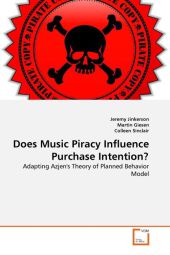 Neuerscheinungen 2010Stand: 2020-01-07 |
Schnellsuche
ISBN/Stichwort/Autor
|
Herderstraße 10
10625 Berlin
Tel.: 030 315 714 16
Fax 030 315 714 14
info@buchspektrum.de |

Martin Giesen, Jeremy Jinkerson, Colleen Sinclair
(Beteiligte)
Does Music Piracy Influence Purchase Intention?
Adapting Azjen´s Theory of Planned Behavior Model
2010. 68 S.
Verlag/Jahr: VDM VERLAG DR. MÜLLER 2010
ISBN: 3-639-28384-8 (3639283848)
Neue ISBN: 978-3-639-28384-6 (9783639283846)
Preis und Lieferzeit: Bitte klicken
The Recording Industry Association of America claims to lose millions of dollars each year from music piracy (RIAA, 2007). Instead of causing loss, digital music piracy may activate norms of reciprocity in individuals pirating. When pirating music, people may feel some obligation to reciprocate by purchasing music or related merchandise. The theory of planned behavior was used to investigate such a possibility and to provide a framework for scale development. Reliable scales were developed for all measured constructs. Regarding piracy, the RIAA´s claim may have some merit. Specifically, previous piracy was associated with decreased reported likelihood to purchase music. However, previous piracy may make one more likely to make music-related purchases in the future. Reciprocity partially mediates this relationship. It appears that, at least to some degree, when the RIAA makes its contentions against piracy, it spurns some of its own merchandise consumers.


